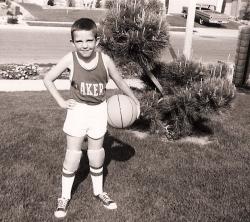All sports involve strategy, teamwork, hustle, hard work, and desire. Coaches teach fundamentals to give the players an excellent foundation for learning a certain sport. But how much time is devoted to teaching sportsmanship? Do coaches today teach their players sportsmanship and—better yet—teach them sportsmanship in action?
When I was coaching a boys’ high school basketball team, I came up with an idea to show my players and our opponents sportsmanship; it would also provide a meal at the same time. I called it “Feed the Foe.”
The meal would be sloppy joes with all the fixings. My team’s parents would do the cooking while their sons were playing, and after the game our team—players and parents—would “Feed the Foe.” Not only would we feed them, but my players would be required to sit in the bleachers with the other team and talk to them. Compete on the court and fellowship after the game.
High school away games always involve a bus ride to the game, the actual game, a quick visit to a fast-food restaurant after the game, and then the return ride home. Taking time to eat and reload the bus is a pain. Not having to stop and feed Johnny would be a blessing, especially considering that our gym was miles from the closest McDonald’s.
I picked the team that had to travel the furthest to be our guinea pig for “Feed the Foe.” I invited them, and they enthusiastically accepted. Now all I had to do was convince my team that this was a good idea.
“Guys,” I said. “We’re hosting the team from Ypsilanti in a couple of Fridays, and we’re doing something different that night.”
“What’s that?” asked one of the seniors.
“Well, we’re going to play them, and then we’re going to feed them. I’m calling it ‘Feed the Foe’.”
“We’re going to do what?!?!”
Yea, it went over well.
I contacted a few parents that were awesome with their support of the team, explained the idea, and then asked for their help. They responded enthusiastically.
Finally, it was game time. I gave a pre-game talk about playing hard, playing as a team, and playing with sportsmanship.
It was a close score throughout the game against the team from Ypsilanti. During the second quarter, the other team took off on a run and no matter how many timeouts I called, I had a hard time stopping the damage. The other team had momentum, energy, and a roaring crowd. They also had the lead.
In the locker room at half time, I talked about effort and the fact that the players were allowing the other team to dictate the tempo of the game. Just as I was about to say something else, Tyler, one of the captains, interrupted with a stirring speech that I thought was excellent.
“Guys! We can do this! We can beat these guys! And no one is going to come into our gym, beat us, AND eat our food!”
Boom!
I believe Tyler’s impassioned plea just took over the top spot from “Win One For the Gipper.”
The third and fourth quarters were tense. We shaved a few points off the other team’s lead, and my guys never quit. However, when the buzzer sounded, I looked up and the scoreboard told the story: the other team did come into our gym, beat us, and was now going to eat our food.
In the locker room after the loss, my talk was short. I told my team I was proud of their effort, they never quit, and we had some things we needed to work on. I also told them to clean up quick, grab some food in the line, and sit with the other team in the stands. The locker room was deathly quiet.
I walked out to the gym and thought that feeding only the players of the other team wouldn’t suffice. I talked with one of the moms working in the kitchen, and she let me know that we had plenty of food to feed everybody in the gym.
An announcement was made that in addition to feeding our foes, we wanted to feed everyone in the gym. The food line and plates soon filled up. Smiles and “thank you” were seen and heard. I chatted with the coach of the other team and a couple of their parents. They asked what made me decide to do this, and I replied, “It seemed like the right thing to do. If it could keep you from driving to find a fast-food joint and take the time to eat, then it was worth it. And it gave my players a chance to interact with players from another school. And I wanted to take the opportunity to teach the team sportsmanship.”
I looked up in the stands, and a huge grin spread out all over my face. There in the middle of three players from Ypsilanti was my captain, Tyler, laughing and talking with the foes. Over to the right, more of my players were sitting in the stands with guys who had just beaten them in a tough basketball game. And they appeared to be enjoying themselves.
A few weeks later, our school received a nice letter from the coach of the other team, thanking us for feeding them with “Feed the Foe.” He said he had parents who were now interested in doing the same thing for one of their opponents who would be travelling a good distance to their gym.
“Feed the Foe” wasn’t an earth-shattering idea. It was an opportunity to teach kids a life lesson: things might not always turn out the way you would like them to, but the way you handle it says quite a bit about your character. And one important character trait is sportsmanship.
















